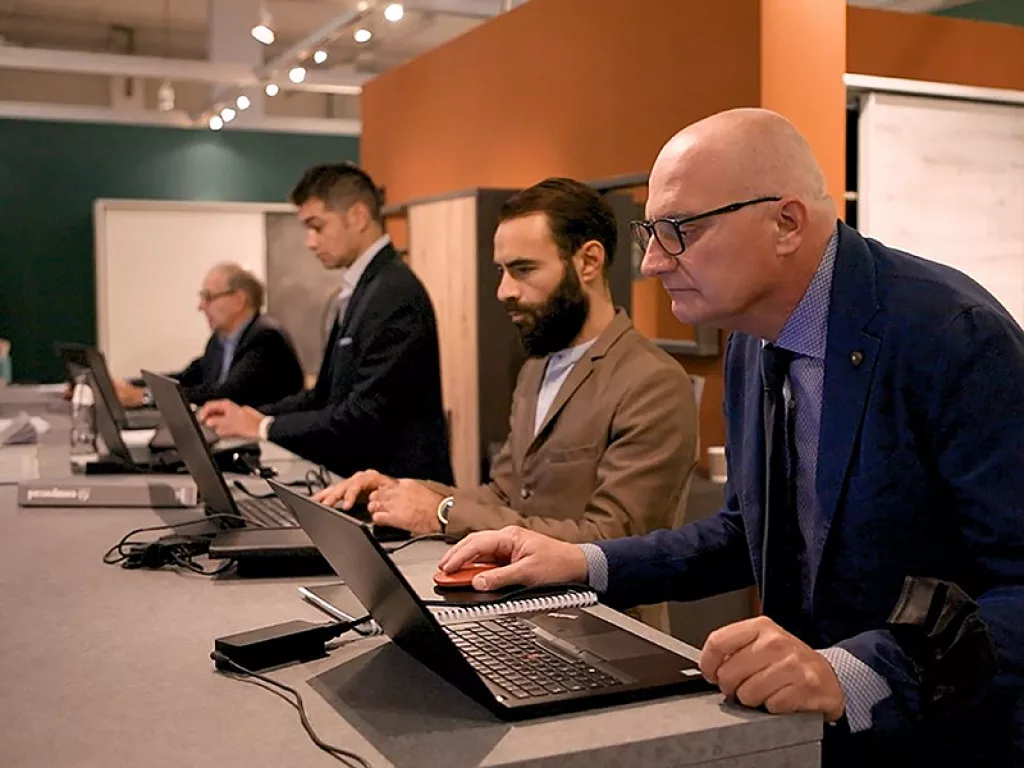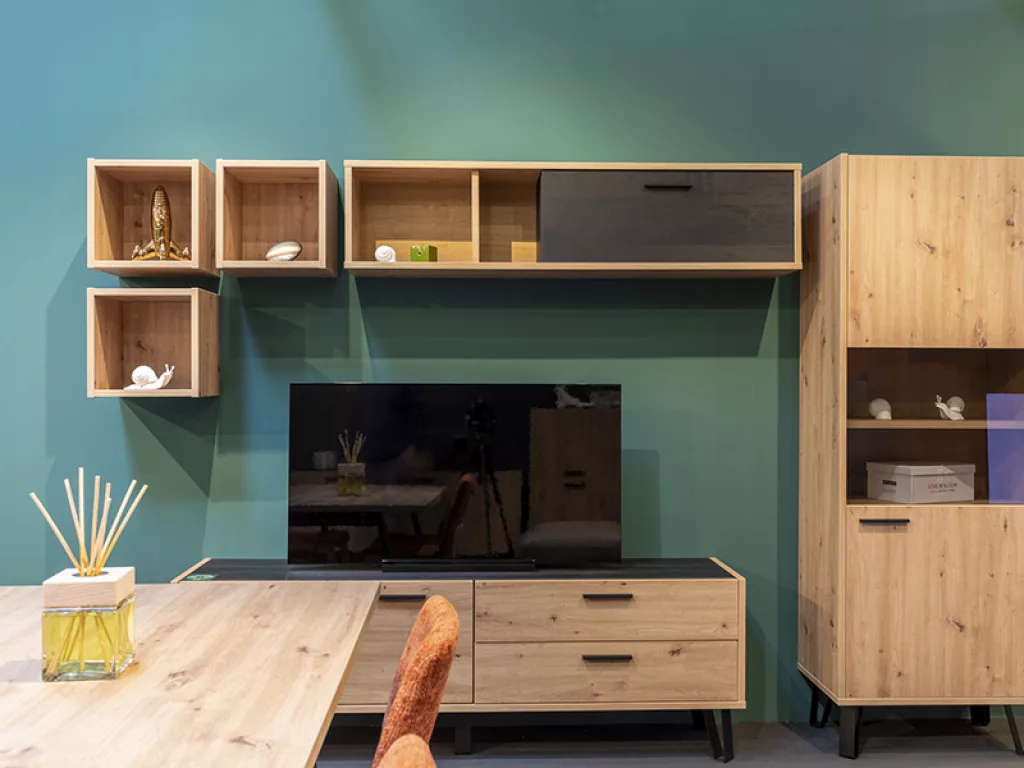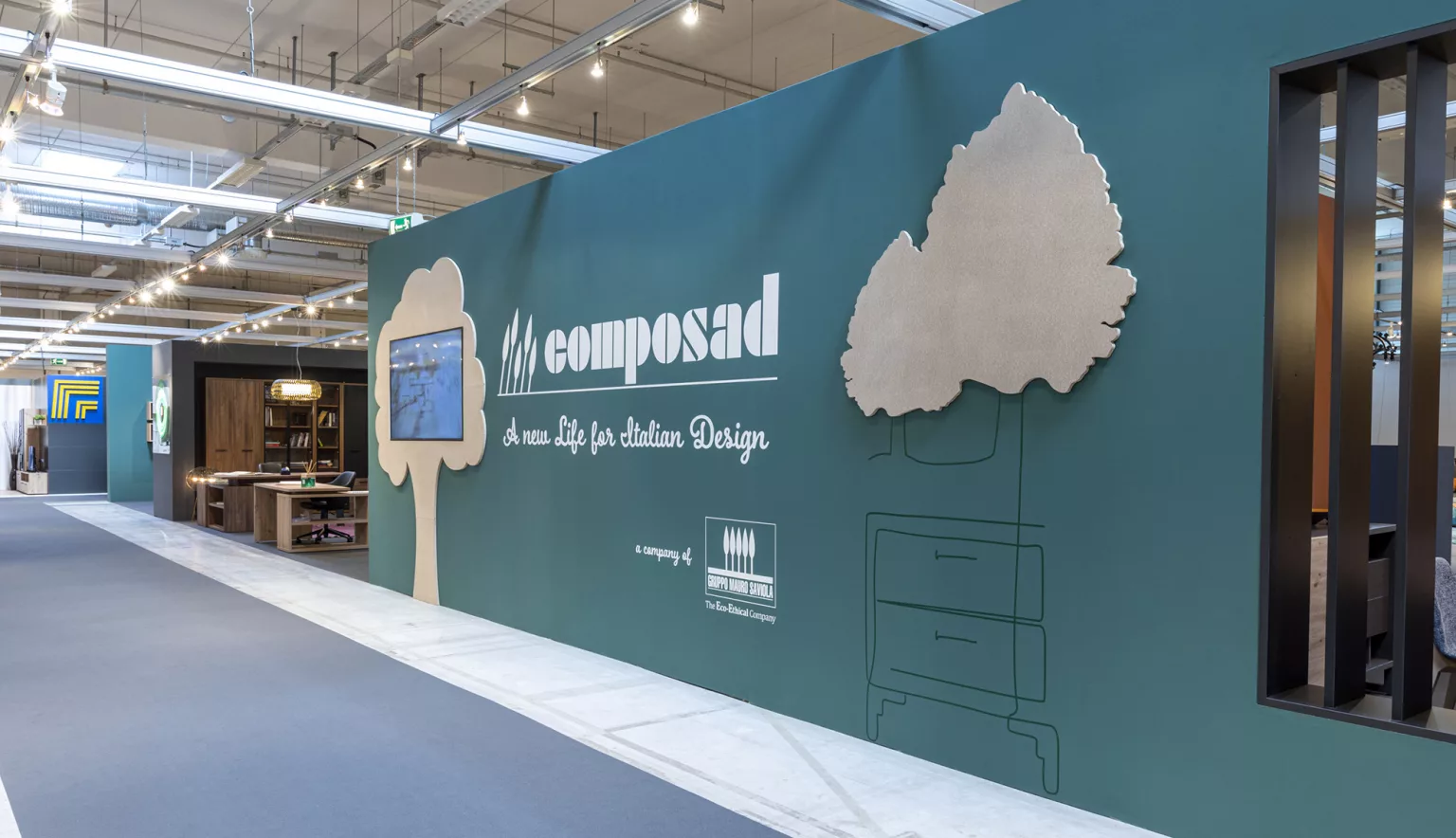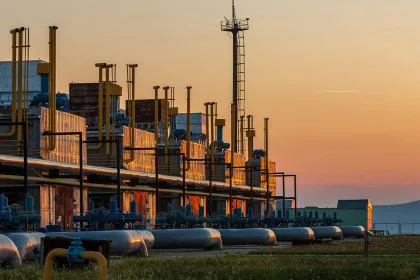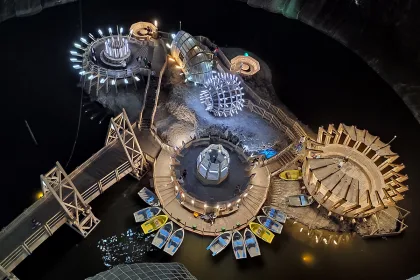Working solely with 100 percent recycled wood, Saviola Holding and the Composad furniture division embody the circular economy. We peel back the layers with Senior Managing Director, Nicola Negri.
REGENERATIVE MANUFACTURING
“It’s not like recycling a bottle to make another bottle – we take that bottle, and we upcycle it to make a ring of diamonds.”
With an eco-ethical business model centred entirely on the concept of upcycling, Saviola Holdings (Saviola) is a wholly vertically integrated, privately-owned Italian enterprise, specialised in producing quality furniture designs made from 100 percent recycled wood.
“If you really want to save the world, buy our products instead of furniture that involves cutting down new trees. Every day, we save 10,000 trees,” continues Senior Managing Director at Composad, Nicola Negri.
A later addition to the original Saviola business, Composad was conceived by the company founder Mauro Saviola back in 2000 – an entrepreneur with an innovative view on manufacturing who wasn’t afraid to go against the grain.
Today, the entire Saviola enterprise is composed of four separate business units; wood, chemicals, furniture (Composad), and Saviolife (fertilisers).
As a proudly Italian, privately-owned company, Saviola marked a significant departure for Negri prior to his experience working for various multi-nationals across Europe – a journey that began within the tyre division of Pirelli in the UK.
Despite this, Negri was enticed by the prospect of a new challenge, combined with the company’s unique and forward-thinking stance as an eco-ethical company.
“In 2015, Saviola was already in the new era of sustainability. It was these fundamentals at the company that I found remarkable, and so I decided to take the risk,” Negri tells us.
“The emphasis on eco-technology was the most attractive part of my saying yes to the offer.”
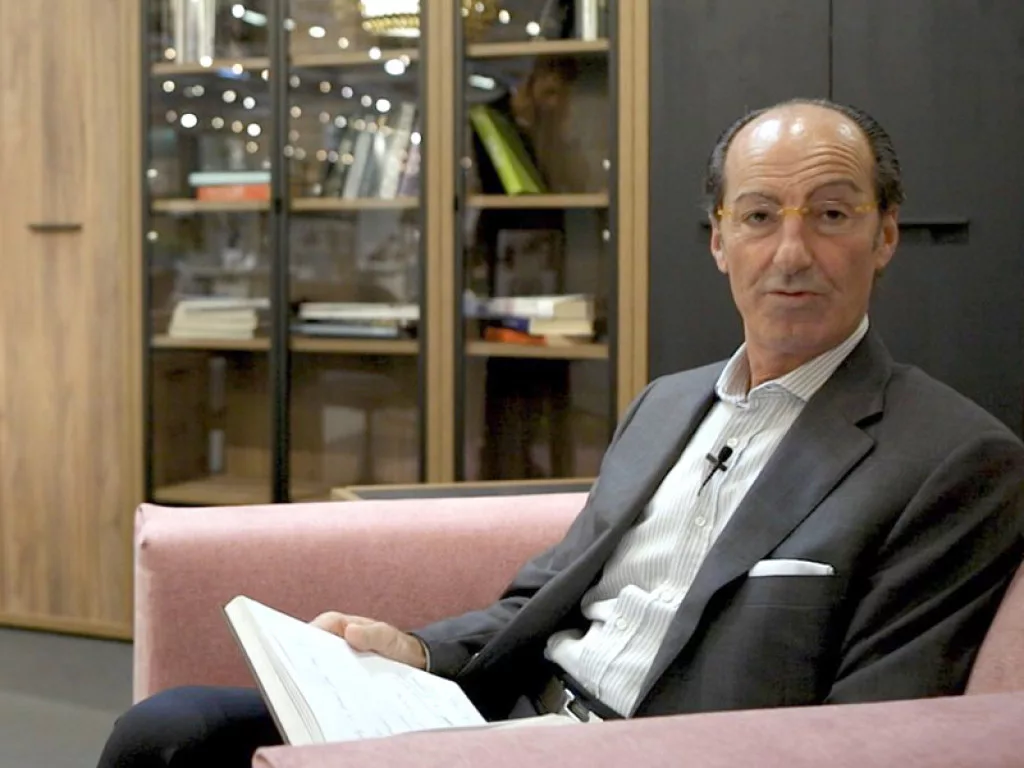
“We are the only company in the world that is making furniture with 100 percent recycled wood and zero logistics emissions”
Nicola Negri, Senior Managing Director, Saviola Holdings
DRIVING THE CIRCULAR ECONOMY
‘Eco-technology’ at Composad represents the company’s greatest differentiator as a furniture manufacturer. This is embodied by the cyclical process used to create the designs, whereby items of furniture are produced centred on quality, design, and beauty, with zero use of virgin wood.
This is where Saviola’s strengths as a robust, fully vertically integrated business come to the fore. It all begins with the sourcing of raw materials. Composad designs depend entirely on a source of recycled wood, which is provided by Saviola in the form of the particle boards, as the company’s core business.
“Saviola has its own collection system as a strategic part of the company, where we collect wood from around Italy, Switzerland, and France, so we are nearly fully independent in terms of collecting wood,” Negri tells us.
Across the entire chain, united under one single vertical flue of materials, the wood business unit is complimented by Saviola’s chemicals division, where the company produces the resins and glue needed for the particle boards. The only materials outsourced by the company, is the energy required in these processes.
GREEN ON GREEN
The bespoke furniture that Composad offers exceeds the remit of just recycling, and instead cottons onto the popular trend of upcycling – the means by which materials are reused to create something with a higher value than the original resources.
“The wood that we use was originally cut to make pallets, which is then crushed when the pallet can no longer be used, or we take the window profiles from buildings that are going to be renovated or destroyed, or old furniture,” Negri outlines.
This is then collected by the company and used to make the furniture that is then sold with a far higher market value than the one-euro pallets that comprise the materials.
“We really are green on green – green because its 100 percent recycled wood, and green because of emission-free in logistics,” he comments.
Elaborating on this statement, Negri returns to the added value of the vertically integrated business model that establishes Composad as a highly differentiated company boasting a zero CO2 emissions footprint in terms of the transportation of materials in the production process.
The nexus of these progressive operations is to be found in the rural commune of Viadana – which Negri fondly refers to as ‘Viadanawood’, the woodworker’s version of Hollywood – located between Milan and Bologna.
“Here you will find an incredible conglomerate of these three companies, where we make the glue, the particle boards, and the furniture. So, from a logistical point of view, we have zero carbon emissions,” he explains.
“Working from this one location – unique in the world – is absolutely essential in terms of our fundamentals in using 100 percent recycled wood and our emphasis on zero-emissions.”
“Our claim at Composad is – yes, it’s all true”
Nicola Negri, Senior Managing Director, Saviola Holdings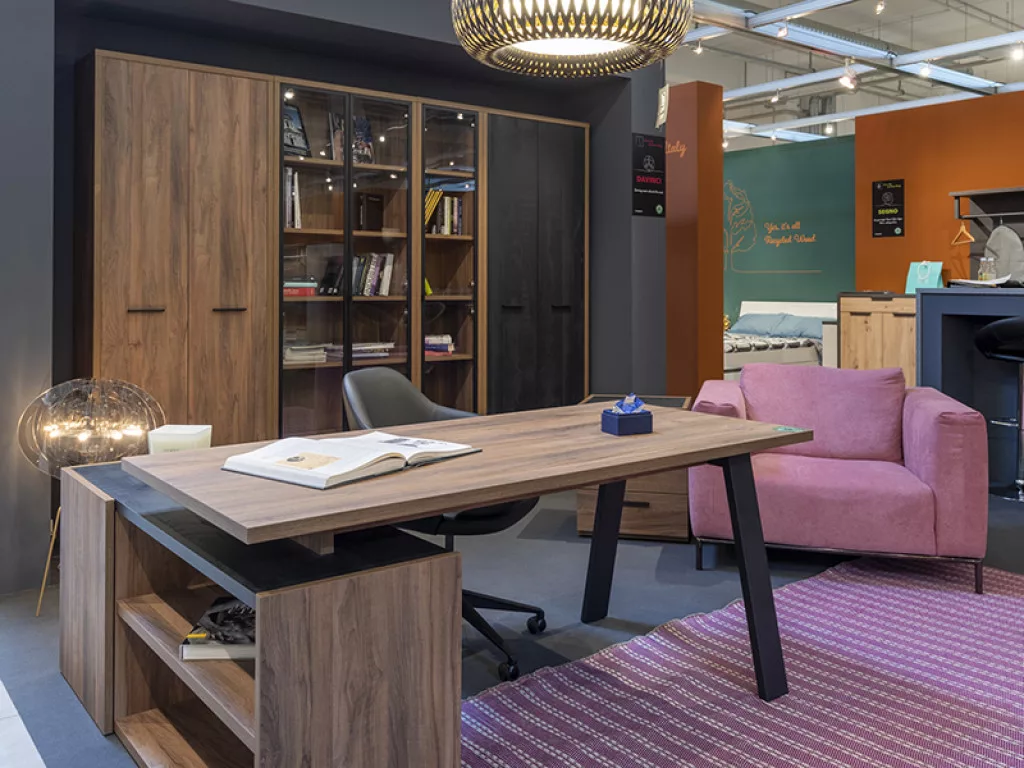
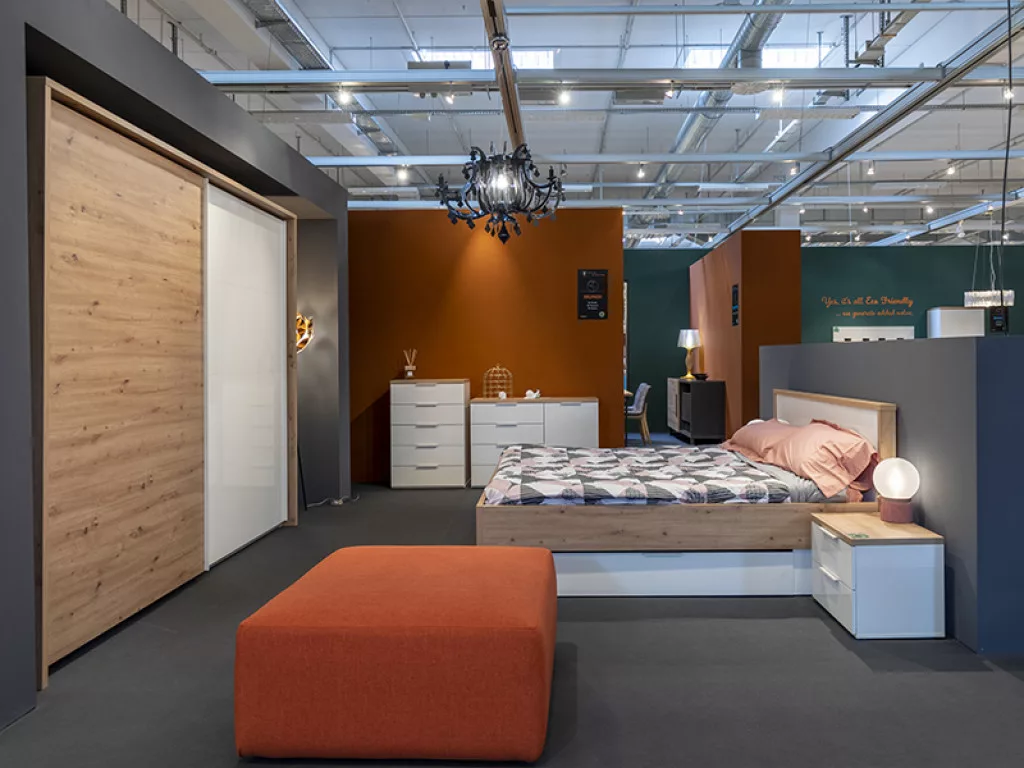
OUT OF THE WOODS
For many, the COVID-19 pandemic posed an unprecedented hurdle, particularly considering Italy was one of the first countries to be hit, resulting in a complete halt on all activities across the country during the third week of March 2020, including manufacturing.
“During that week, we couldn’t even deliver what we already had in the warehouse,” Negri recalls.
Yet in terms of navigating crises, Negri came seasoned with experience. This is where his background in multi-nationals provided valuable preparation in establishing the confidence to survive turbulent times.
“Management sat round the table, and we said, guys, this has already happened – it happened in 2009 when the financial crisis hit Europe, and I bring my experience because I have already been through that crisis when sitting in the board of Wavin.”
Indeed, Negri recounted that the UK was the first European country to suffer the impact, with his company’s facilities undergoing a significant financial loss. At that time, the Wavin board identified the need to convince other big companies across Europe that there would be a ripple effect that would see everyone affected.
In anticipation, Negri observed a similar reaction at the outbreak of COVID-19 and acted accordingly.
“At the beginning of COVID-19, we were saying that it was a Chinese affair that wasn’t going to come here, in the same way that we thought the financial hit was a US affair. We are so integrated these days that whatever happens wherever in the world will surely hit everybody – exactly as it was in 2009.
“We realised that we were never going to be able to convince a generation of managers that this crisis was also going to hit them. Each year there was a focus on how to do more than the previous year so there was no way that you could explain that next year, our budget will be down – management will never accept that. So, first, we had to convince the management that change was coming.”
In preparation, Composad and the wider Saviola group implemented a ‘fire-brigade exercise’, whereby the company outlined three potential scenarios and forecasted the financial impact on the company for each outcome.
“The first – and worst scenario – was that COVID-19 was going to hit us tremendously, and then at the start of 2021 we will be able to recover and start again. Secondly, that it will last until just after the summer of that year, and the third – best scenario -, that we would begin to recover before the summer,” he explains.
“We put down these three scenarios and worked out the cost reductions that we would need to put in place to prepare. Since then, we have been continuously controlling the situation to best understand which scenario was beginning to take reality.
“Once you put down a plan with your imagination, you begin to recognise how far you are from one or the other and take the actions necessary to follow the plan that you have in place.”
The headwinds of the COVID-19 pandemic have of course been trialling for the company, with the expected drop in sales that were suffered universally, and with the continuing aftermath of the disruption on worldwide supply chains, which Negri believes is only just starting to be fully realised.
“Due to the length of container queues around the world, it is now that the delays are hitting and the supply chain will become critical particularly for the next two years.”
Indeed, Negri likens the current state of play within supply chains to a boat adrift in the doldrums, simply waiting for the winds to start up again.
“From a supply chain point of view, we have been like a sailboat. When the wind stops, it’s not that the boat stops. At the beginning of last year, there was no major impact and the boat was still going, but it’s really this year that we are feeling the effects of COVID-19 on the supply chain as the wind drops.”
This presented a particular struggle for Composad, with just 10 percent of the company’s sales based in Italy and the remainder spread worldwide.
Yet, thanks to these pre-emptive management tactics and the advantageous headwinds due to a global shift in consumer behaviour, Composad has been able to emerge from the crisis relatively unscathed.
“Despite our drop in sales in 2020, we were able to re-adapt the company towards that loss. We did this without affecting our immediate EBITDA margin, since this is the figure considered as the most important indicator for stock exchange listed companies.
“This was the target that we put down with all three different scenarios that we prepared for.”
This was also thanks to the advent of remote-working, whereby customers became entirely dependent on home offices.
“From a customer point of view for Composad, staying inside for everyone changed the face of our homes. About 40 percent of our Composad products are in home offices, so you can imagine what happened to our requests!”
For the years ahead, Composad will focus on refining and improving its existing processes and methods of operation, to continue doing what it already is, but even better.
With an overarching mission to extend the brand’s messaging to the younger generations and communicating Composad’s visionary mission to the end user, Negri will continue to bring the Saviola name out of the woodwork.
“We are not fake news or marginal – we really make it all of our furniture with absolutely no use of virgin wood,” he concludes.
“Our claim and our new logo at Composad is – yes, it’s all true.”
